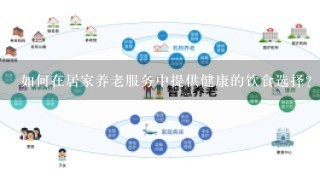如何在居家养老服务中提供健康的饮食选择?

Healthy Meal Choices in Residential Care Facilities
1. Nutritional Assessment:
- Conduct a comprehensive nutritional assessment to determine individual dietary needs, preferences, and restrictions.
- Consider factors such as age, health conditions, medications, and cultural background.
2. Balanced Diet:
- Provide a balanced diet that includes a variety of nutrient-rich foods from all food groups.
- Offer a selection of fruits, vegetables, lean proteins, whole grains, and healthy fats.
- Ensure portion control and avoid overfeeding.
3. Individualized Menu:
- Develop individualized menus that cater to specific dietary restrictions and preferences.
- Consider allergies, intolerances, and cultural dietary norms.
- Encourage participation in the menu planning process.
4. Meal Variety and Texture:
- Offer a variety of meal options to ensure nutritional diversity.
- Consider different textures, such as soft, creamy, or crunchy, to accommodate different preferences.
- Provide a mix of familiar and unfamiliar foods.
5. Hydration:
- Encourage adequate hydration by providing plenty of water and other beverages.
- Offer milk, juice, and other dairy alternatives as choices.
6. Food Presentation and Environment:
- Present meals in a pleasant and appetizing manner.
- Use clear and descriptive menus to facilitate choice.
- Create a welcoming and comfortable dining environment.
7. Staff Training:
- Train staff members on proper food handling, serving techniques, and communication skills.
- Ensure staff are knowledgeable about dietary restrictions and preferences.
8. Collaboration with Families:
- Encourage communication between the facility, families, and healthcare professionals.
- Share meal choices and preferences with families to ensure consistency.
9. Regular Monitoring:
- Regularly monitor meal quality, portion sizes, and overall dietary satisfaction.
- Make adjustments as needed to ensure nutritional goals are met.
10. Technology Integration:
- Utilize technology to track meal preferences, dietary restrictions, and dining patterns.
- Provide mobile apps or online platforms for residents and families to access meal choices and track their intake.




















































































